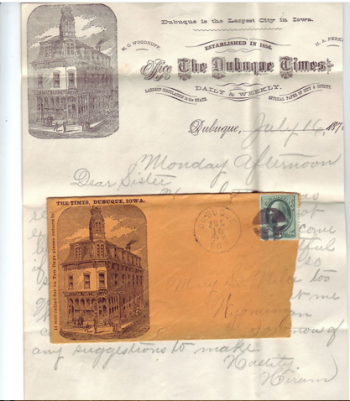Encyclopedia Dubuque
"Encyclopedia Dubuque is the online authority for all things Dubuque, written by the people who know the city best.”
Marshall Cohen—researcher and producer, CNN
Affiliated with the Local History Network of the State Historical Society of Iowa, and the Iowa Museum Association.
NEWSPAPERS
NEWSPAPERS. Dubuque has been the scene of intense competition in the field of newspaper publication. On May 11, 1836, the first issue of the DUBUQUE VISITOR was published by John KING. Like many of its successors, the Visitor had a short life. The Iowa News, the next paper in Dubuque, ran its first issue on June 3, 1837. The lead story concerned the confessions of an alcoholic.
The Miners Express, the first strong political paper in Dubuque, began publication around August 1, 1841. Avery Thomas purchased the needed materials in Cincinnati. David S. WILSON and Andrew KEESECKER who had been involved with the Dubuque Visitor were the editors. Known as the "Thunder" for its support of Democrats over Whigs, the Express, published by Avery Thomas, merged with the Iowa News in 1842. In January 1845, Keesecker sold his interest in the paper to George GREENE, an individual often credited with the development of Cedar Rapids, Iowa. Support for the Whig Party came through the Democratic Telegraph first published by Orlando MCCRANEY in 1848.
Newspapers flourished in the following years. A paper called the IOWA TRANSCRIPT appeared in 1843. By 1854 Dubuque hosted four daily papers including the DUBUQUE OBSERVER; Dubuque Tribune, the first of the daily newspapers (1851); Dubuque Herald; and the Miners Express. There were also four weekly newspapers, including the Demokrat which was published completely in German, and one tri-weekly publication. News in early Dubuque was often hard to find as most people were busily involved with MINING. Those who read the papers found advertisements for doctors and peddlers on the front page with local news farther back. Obituaries appeared in many sections of the paper and under such titles as "Called Home" and "Taps."
In 1854 the Dubuque Herald merged with the Miners Express to form the Express and Herald. By 1855 the word "Express" had been dropped, and the Northwest, founded in 1855, was bought out. In 1857 the Dubuque Daily Ledger and the Dubuque Times, the only Republican daily journal in Iowa, began publication. The only other newspaper to enter the 1860s market was the Union, a paper that lasted only several weeks. During the CIVIL WAR the Times and Herald argued bitterly. By the close of the war, Dubuque was supporting ten papers.
In 1871 Patrick J. QUIGLEY and S. D. Rich founded the Dubuque Daily Telegraph, a paper historians have credited with supporting reforms to improve living conditions. The quarrels between the Democratic Herald and the Republican Times continued during Reconstruction, but occasionally the two cooperated as on February 6, 1887, when the Herald helped publish the Times after a fire ruined the Times' offices and damaged their press.
The 1890s in Dubuque newspaper circles were times of merger. The Ledger was sold. The name was changed to the Globe which bought the Times and another paper, the Journal. The Globe-Journal became the city's evening paper, while the Times was the morning paper. The Times and Journal consolidated in 1906 to become the Times-Journal. Two competitors, the Telegraph and Herald merged in 1901 to become the TELEGRAPH HERALD (the name was hyphenated until 1973). In 1919 the Daily News attempted to find publishing room in Dubuque but was ultimately purchased by the Times-Journal in 1921.
The circulation of the Telegraph-Herald continued to grow. In 1914 the paper moved from rented space at 7th and Main to more spacious quarters at 5th and Main. In 1927 the paper, under the presidency of Fred W. WOODWARD, negotiated the purchase of the Times-Journal. In 1935 Frederick Robert WOODWARD joined the paper as its secretary and treasurer. The first issue of the paper to be printed from the present building at 8th and Bluff appeared on the STREETS on July 14, 1930.
In 1965, after a court battle, the Woodward family purchased total control in the paper from the Quigley family. The Telegraph Herald is today a division of WOODWARD COMMUNICATIONS, INC.
On February 29,1966, the Telegraph Herald made newspaper publishing history by using the first Goss Metro Offset double-wide press ever built.
---
Sources:
Oldt, Franklin T. The History of Dubuque County. Chicago: Goodspeed Historical Association, p. 70-72



